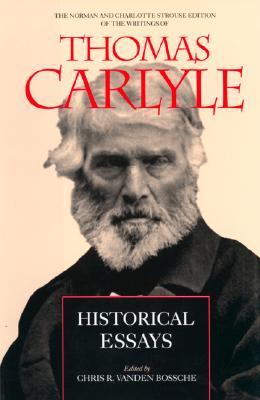Historical Essays
by Thomas Carlyle
Thomas Carlyle, renowned nineteenth-century essayist and social critic, came to be thought of as a secular prophet by many of his readers and as the "undoubted head of English letters" by Ralph Waldo Emerson. Historical Essays Historical Essays brings together Carlyle's essays on history and historical subjects in a fully annotated modern edition for the first time. These essays, which were originally collected in Critical and Miscellaneous Essays, Critical and Miscellaneous Essays, span Carlyle's career from 1830 to 1875 and represent a major facet of his writings. This edition uses all the extant authoritative versions of the essays to create an accurate critical text and includes a mine of lucidly presented information to enhance readers' understanding of Carlyle's densely allusive prose.
The collection includes essays on the French Revolution, Cromwell, Frederick the Great, and medieval Scandinavia. It also includes such essential pieces as "On History," "On History Again," "Count Cagliostro," and "The Diamond Necklace." Together the essays show Carlyle positioning himself in relation to the new Romantic historiography but not yet ready to adopt the strictures of modern scientific history. They also exhibit his talent for analyzing the historical significance of seemingly minor events. He describes a plot to steal a diamond necklace in which Marie Antoinette became implicated, a visit of Whig sympathizers to the National Assembly during the French Revolution, and the kidnapping of two fifteenth-century German princes, one of whose descendents was Carlyle’s contemporary Prince Albert.
This volume, the third of the eight-volume Strouse Edition of Carlyle’s works, includes a historical introduction and illustrations along with complete textual apparatus.
The collection includes essays on the French Revolution, Cromwell, Frederick the Great, and medieval Scandinavia. It also includes such essential pieces as "On History," "On History Again," "Count Cagliostro," and "The Diamond Necklace." Together the essays show Carlyle positioning himself in relation to the new Romantic historiography but not yet ready to adopt the strictures of modern scientific history. They also exhibit his talent for analyzing the historical significance of seemingly minor events. He describes a plot to steal a diamond necklace in which Marie Antoinette became implicated, a visit of Whig sympathizers to the National Assembly during the French Revolution, and the kidnapping of two fifteenth-century German princes, one of whose descendents was Carlyle’s contemporary Prince Albert.
This volume, the third of the eight-volume Strouse Edition of Carlyle’s works, includes a historical introduction and illustrations along with complete textual apparatus.
BUY NOW
Hardcover, 1256 pages
Published March 25th 2003 by University of California Press (first published 2002)
© 2025 Bibleportal.com 版权所有.

Thomas Carlyle was a Scottish satirical writer, essayist, historian and teacher during the Victorian era. He called economics "the dismal science", wrote articles for the Edinburgh Encyclopedia, and became a controversial social commentator.
Coming from a strict Calvinist family, Carlyle was expected by his parents to become a preacher, but while at the University of Edinburgh, he lost his Christian faith. Calvinist values, however, remained with him throughout his life. This combination of a religious temperament with loss of faith in traditional Christianity made Carlyle's work appealing to many Victorians who were grappling with scientific and political changes that threatened the traditional social order.
... Show more